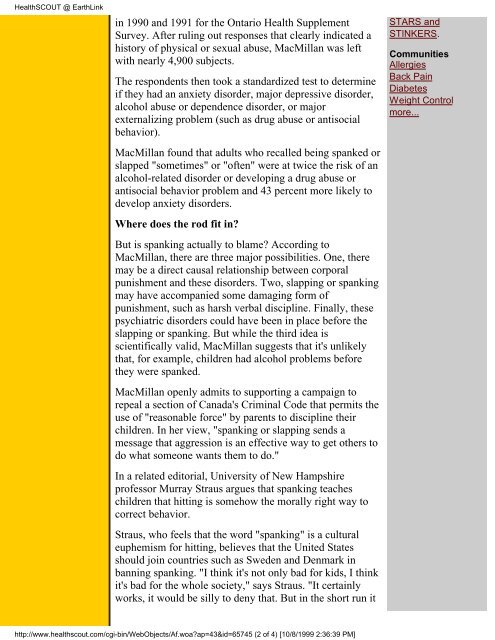spanking - Unauthorized web page
spanking - Unauthorized web page
spanking - Unauthorized web page
You also want an ePaper? Increase the reach of your titles
YUMPU automatically turns print PDFs into web optimized ePapers that Google loves.
HealthSCOUT @ EarthLink<br />
in 1990 and 1991 for the Ontario Health Supplement<br />
Survey. After ruling out responses that clearly indicated a<br />
history of physical or sexual abuse, MacMillan was left<br />
with nearly 4,900 subjects.<br />
The respondents then took a standardized test to determine<br />
if they had an anxiety disorder, major depressive disorder,<br />
alcohol abuse or dependence disorder, or major<br />
externalizing problem (such as drug abuse or antisocial<br />
behavior).<br />
MacMillan found that adults who recalled being spanked or<br />
slapped "sometimes" or "often" were at twice the risk of an<br />
alcohol-related disorder or developing a drug abuse or<br />
antisocial behavior problem and 43 percent more likely to<br />
develop anxiety disorders.<br />
Where does the rod fit in?<br />
But is <strong>spanking</strong> actually to blame? According to<br />
MacMillan, there are three major possibilities. One, there<br />
may be a direct causal relationship between corporal<br />
punishment and these disorders. Two, slapping or <strong>spanking</strong><br />
may have accompanied some damaging form of<br />
punishment, such as harsh verbal discipline. Finally, these<br />
psychiatric disorders could have been in place before the<br />
slapping or <strong>spanking</strong>. But while the third idea is<br />
scientifically valid, MacMillan suggests that it's unlikely<br />
that, for example, children had alcohol problems before<br />
they were spanked.<br />
MacMillan openly admits to supporting a campaign to<br />
repeal a section of Canada's Criminal Code that permits the<br />
use of "reasonable force" by parents to discipline their<br />
children. In her view, "<strong>spanking</strong> or slapping sends a<br />
message that aggression is an effective way to get others to<br />
do what someone wants them to do."<br />
In a related editorial, University of New Hampshire<br />
professor Murray Straus argues that <strong>spanking</strong> teaches<br />
children that hitting is somehow the morally right way to<br />
correct behavior.<br />
Straus, who feels that the word "<strong>spanking</strong>" is a cultural<br />
euphemism for hitting, believes that the United States<br />
should join countries such as Sweden and Denmark in<br />
banning <strong>spanking</strong>. "I think it's not only bad for kids, I think<br />
it's bad for the whole society," says Straus. "It certainly<br />
works, it would be silly to deny that. But in the short run it<br />
http://www.healthscout.com/cgi-bin/WebObjects/Af.woa?ap=43&id=65745 (2 of 4) [10/8/1999 2:36:39 PM]<br />
STARS and<br />
STINKERS.<br />
Communities<br />
Allergies<br />
Back Pain<br />
Diabetes<br />
Weight Control<br />
more...






